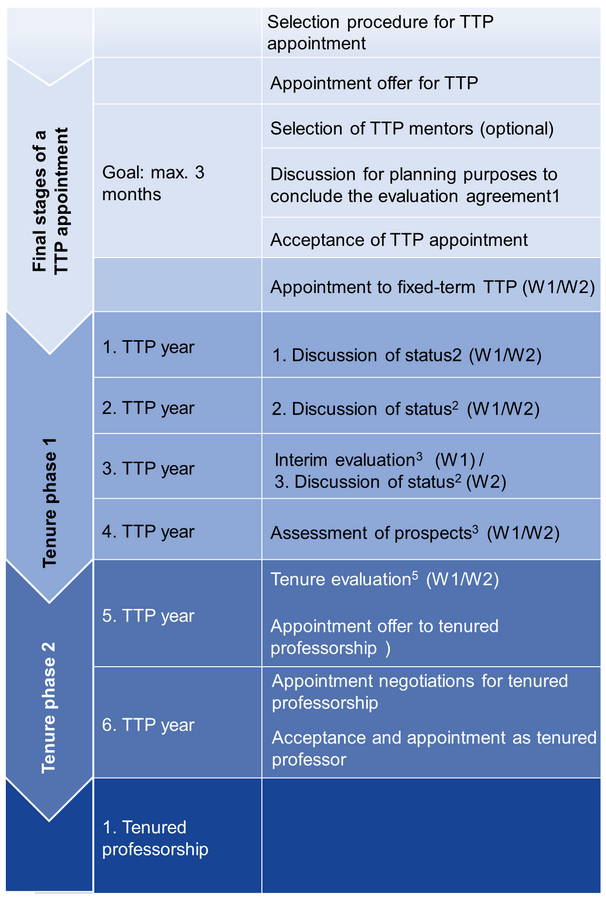The Leipzig Tenure-Track Programme (LTTP) attracts excellent national and international researchers in their early career phase to Leipzig University (UL). The LTTP was designed with outstanding postdocs in mind who recently finished their doctorate (Recognised Researcher, R2) and would like to make a long-term commitment to carrying out their research and teaching at UL.
The tenure-track professorships are a well-established part of Leipzig University’s structures. They complement the existing routes to a professorship as an additional career path. When professorships need to be filled, Leipzig University therefore regularly calls for applications for tenure-track professors. This supports the further development of the academic staff structure and contributes to a cultural change in the university system.
Advantages of tenure-track professorships at Leipzig University:
- A predictable path for becoming a tenured professor at an early stage
- Transparent appointment process
- Clear and binding performance goals are set down together and must be fulfilled in order to transition to a tenured professorship
- Early independence in the areas of research, teaching, academic self-government and transfer
- Resources to support tenure-track professors in developing the necessary skills
The following graphic shows an example of a standard tenure-track process from the selection procedure to appointment as a tenured professor. Exceptions to this process are possible and are outlined in the Tenure-Track Regulations..
Note on junior research groups with tenure track for a tenured professorship (W2 or W3):
- After successfully completing the appointment process for heading a junior research group, then in a step similar to the appointment offer for a fixed-term tenure-track professorship, an offer is made to be hired as the head of a junior research group with a tenure track for a tenured professorship.
- The head of the junior research group is assisted in their performance trajectory in the same way as tenure-track professors; a particular focus is placed on achieving the qualifications necessary for an appointment; this goal is emphasised appropriately in the evaluation agreement and is explicitly assessed.
Leipzig University offers three options for reaching a tenured professorship on a tenure track. These options are geared towards researchers with various qualification levels:
- Appointment to a fixed-term junior professorship (W1) with tenure track for a tenured professorship (W2 or W3)
- Position as the head of a junior research group with tenure track for a tenured professorship (W2 or W3)
- Appointment to a fixed-term chair (W2) with tenure track for a tenured professorship (W2 or W3)
Leipzig University and research institutions outside the University can also jointly appoint tenure-track professors to encourage and intensify collaboration among staff and within disciplines in research and teaching.
As a tenure-track professor, you benefit from various services for academic staff development on your path to a tenured professorship:
- Support, for example with preparing for the planning discussion and in writing the evaluation agreement.
- Advice for needs-based skills development using the resources provided by the Leipzig Researcher Development Programme (LRDP), for example those in the areas of research management, key skills and professional development, or teaching and supervising.
- Personal skills development in the “Netzwerk Führung und Karriere in der Wissenschaft” (Network for leadership and careers in academics), for example with workshops on legal regulations, the micro-politics of universities, your own skills and research profile, or on leadership and management skills. The event series was created jointly and is available exclusively for tenure-track professors at the eight organising universities in Saxony, Saxony-Anhalt and Thuringia.
- Individual assistance during your tenure-track professorship, for example in determining where you stand in the process for your annual status discussions.
- Networking with your peers within the University and across the region.
You also have access to other services, such as those offered in the Mentoring Programme for Female Postdocs in the Halle-Jena-Leipzig Central German University Alliance.
Materials and documents on tenure track
The regulations for a transparent process when appointing tenure-track professors, concluding evaluation agreements, deciding on individual staff development measures and the evaluation and appointment to a tenured professorship are set down in the following regulations and documents (these are currently only available in German):
- Appointment Regulations (BerO),
- Tenure-Track Regulations (TTO),
- Interim Evaluation Regulations (ZevaO),
- Quality Assurance Concept (QSK)
More materials are available on the Intranet:
You can find information in German on the Leipzig Tenure-Track Programme including the Federal and State Programme to Support Early Career Researchers (WISNA) here:
If you have questions about the appointment process for tenure-track professors, their evaluation or the subsequent appointment to a tenured professorship, please contact:
If you have questions about the appointment process for tenure-track professors, their evaluation or the subsequent appointment to a tenured professorship, please contact:
If you have questions about your possibilities for being appointed as a tenure-track professor, your professional development during that time or the Leipzig Researcher Development Programme, please contact:
Tenure-track programme of the federal and state governments
With the Tenure-Track Programme to Support Early Career Researchers (WISNA), the federal government has provided one billion euros to set up 1,000 tenure-track professorships (TTP) in Germany. The goal of the TTPs is to make academic career paths to a tenured professorship more transparent and predictable at an early stage. TTPs are to become more prominent as one option among several for reaching a tenured professorship. The TTP is an internationally well-known and accepted career path, and the federal government endeavours to improve the competitiveness of the academic system by strengthening TTPs in Germany. You can find more information about the federal and state programme in German on the pages of the Federal Ministry of Education and Research (BMBF).
Across Germany, 75 universities have received grants for TTPs in two selection rounds (2017 and 2019). Leipzig University was successful with its application in 2019 and received funding for 22 TTPs. The costs for establishing TTPs are subsidised by the project funding for the duration of the programme.


































































